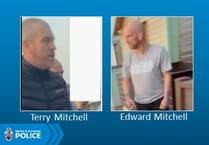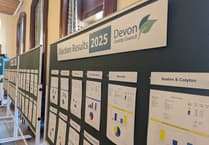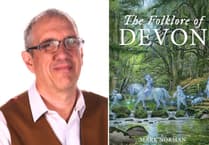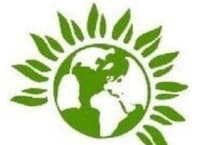MEMBERS of Thorverton History Society enjoyed a talk by Paul Roberts about the life of “John Roberts - the man with 30 grandsons in the Great War” , at the February meeting.
John Roberts was an ordinary man who was born, lived and died in Devon. He was a farm worker from Witheridge, died there at the age of 90 in 1919 and is buried in an unmarked grave.
Paul’s journey into the family past started 10 years ago with a chance find of a photograph in a local newspaper. The photo was of John Roberts sporting bushy sideburns and beard and wearing a bowler hat.
The news article was about a man who had 30 grandsons on active service fighting for King and Country. All of these young men had been born in Devon and most were farm workers.
Paul’s grandfather had served in the war and Paul had a photo of him along with buttons from his uniform but these had been put away for years until his research started.
Paul felt there was a similarity between the images and visited Witheridge to look for a grave. Unable to find it he looked at the war memorial and found the name of A Roberts on it. This turned out to be Albert Roberts, one of the grandsons who was killed in France aged 19.
In total seven of the grandsons died in the war. Three were killed in action, three died of wounds and one died from heart disease.
Several of them had miraculous escapes and one survived despite being shot in the head.
Our talk looked at the service and life of Archibald Roberts because of his connection to Thorverton. Archie was born near Black Dog, went to school in Tiverton and was a farm worker at Butterleigh before joining the 13th Hussars in late 1915.
Many people know about the charge of the Light Brigade but few are aware of the heroic charges made by the 13th Hussars that Archie was involved in.
The first was in Mesopotamia when the Hussars were involved in a charge at Lajj (near Baghdad) in March 1917. In a blinding dust storm they came under rifle and canon fire and were ordered to draw swords and charge the Turkish troops.
They were outnumbered so had to withdraw and occupy captured enemy trenches. During the night the enemy withdrew although the Hussars lost several officers and other ranks.
Many soldiers were wounded and many horses were lost. A few days later Baghdad was captured and the 13th Hussars were the first cavalry regiment to enter the city.
Their next great charge was in October 1918 at Hadraniya, just a few days before the armistice. The journey there was difficult and several soldiers were lost in flooded rivers.
The Turks were making a last stand and the charge was made over open ground against rifle and machine gun fire. The charge was successful and on reaching enemy lines they dismounted and fixed bayonets for a hand-to-hand fight with the enemy.
The enemy retreated after an hour and although the Hussars were outnumbered they suffered few casualties.
Archie was honourably discharged from the Army in late 1918 after being wounded in battle and was no longer fit for active service. He was awarded the silver war badge along with two medals to show he had done his duty in serving King and Country.
In 1922 Archie married Edith Batten in Thorverton Church. He was working at Yellowford Farm for Percy Thomas and he lived at Berrysbridge.
He had six children and one of them still lives locally. Archie died in 1968 at the age of 74. His widow Edith died in 1984 aged 80.
Archie’s older brother John served with the Ninth Devons and survived the war but died at the age of 46. Another brother Sidney served with the Queens Westminster Rifles but died of wounds in Belgium. He is remembered on the war memorials at Oakford and Dulverton.
Paul’s book “History Maker” is available from various outlets locally and shows the enormity of the sacrifices made during the war by ordinary families in Devon.
Robert Turner




